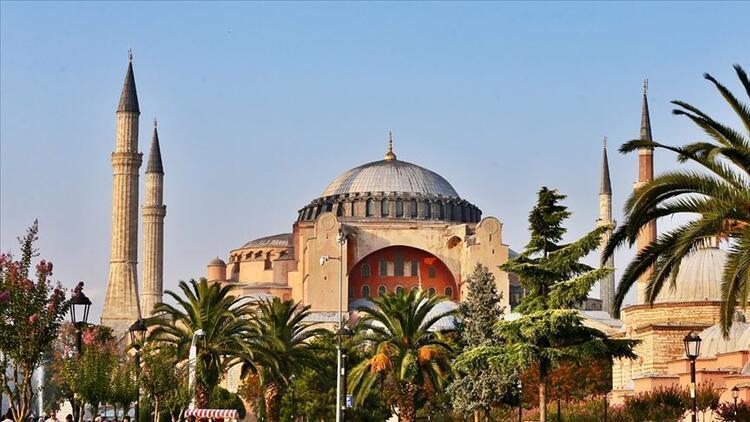
President Recep Tayyip Erdoğan issued a decree on July 10 to formally declare the Hagia Sophia as a mosque, minutes after Turkey’s administrative court annulled a 1934-dated decision that paved the way for the use of the 15-century-old structure as a museum.
Erdoğan’s decree cited the Council of State’s verdict as the basis of his move for the transfer of the powers concerning the use of the Hagia Sophia to the Directorate of Religious Affairs (Diyanet).
Crowds were observed to be gathered in front of the Hagia Sophia after news broke out on the status change.
The Council of State issued its ruling in a statement late afternoon July 10, ending a years-long legal process over the status of the Hagia Sophia upon the appeal of an Istanbul-based association.
The court based its verdict on the fact that the Hagia Sophia was a property of the Fatih Sultan Mehmet Han Foundation and registered to be used only as a mosque. The decision to grant a status of museum to the Hagia Sophia was given by former President Mustafa Kemal Atatürk in 1934.
The reasoning of the Council of State stressed that the government in 1934 had no powers to change the status of the religious structure.
Earlier in the day, Finance and Treasury Minister Berat Albayrak and Justice Minister Abdülhamit Gül expressed their expectations of opening the Hagia Sophia to worship for the Muslims in separate tweets.
Albayrak cited a line from a poem by Turkish poet Necip Fazıl Kısakürek that read “Wait for it, folks! Either today or tomorrow, the Hagia Sophia will be opened!”
The matter of Hagia Sophia’s status came up when Turkey marked the 567th anniversary of the conquest on May 29 by reading passages from the Muslim holy book, the Quran, in the Hagia Sophia.
Erdoğan had proposed restoring the mosque status of the UNESCO World Heritage Site, a building at the heart of both the Christian Byzantine and Muslim Ottoman empires and today one of Turkey’s most visited monuments.
Later, the debate over the site has turned into a domestic political row and prompted international criticism from religious and political leaders worldwide.
Istanbul-based Patriarch Bartholomew I, considered the spiritual leader of the world’s Orthodox Christians, urged Turkey earlier this week to keep Hagia Sophia as a museum. Bartholomew argued that its conversion into a mosque “will turn millions of Christians across the world against Islam.”
While France’s Foreign Ministry said on July 2 that the sixth-century structure must remain open to all, Greece said that Turkey risked opening up “a huge emotional chasm” with Christian countries if it pressed ahead with a proposal to convert the Hagia Sophia museum into a mosque.
“Hagia Sophia is a world heritage monument... Many countries, culminating in the intervention of the U.S State Department, highlighted this very point, urging Turkey not to take steps which would create a huge emotional chasm between the Christians of the world and Turkey,” Greek government spokesman Stelios Petsas told a news briefing.
Erdoğan said on July 3 that criticism of Turkey over the possible conversion of Istanbul’s landmark Hagia Sophia monument from a museum to a mosque “is an attack on Turkey’s sovereignty.”
“Accusations against our country about Hagia Sophia directly target our sovereign rights,” said Erdoğan, responding to concern over the proposal from the West, particularly Greece, France and the United States.
“We are determined to continue to protect the rights of Muslims, our country’s majority faith, as well as members of all other faiths and religions,” he added at the formal opening of another mosque in Istanbul.
Earlier, Turkey said it was “shocked” at a statement by U.S. Secretary of State Mike Pompeo urging Erdoğan not to go ahead with the plan.
Pompeo had said in a statement that the museum status should be maintained “as an exemplar of [Turkey’s] commitment to respect the faith traditions and diverse history that contributed to the Republic of Turkey, and to ensure it remains accessible to all.”